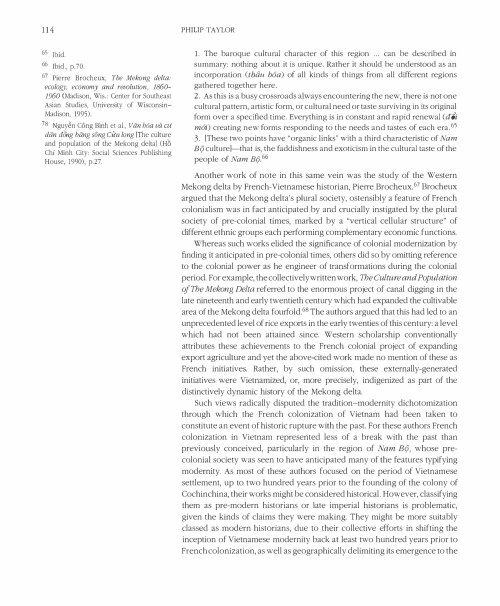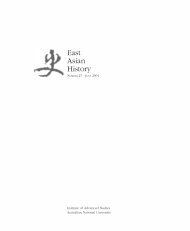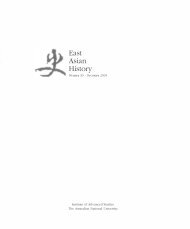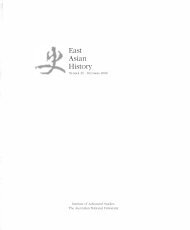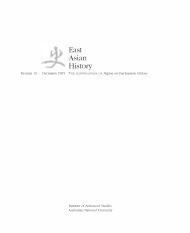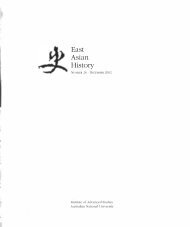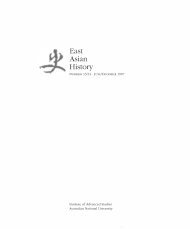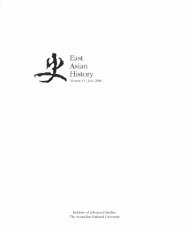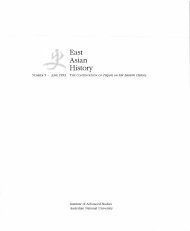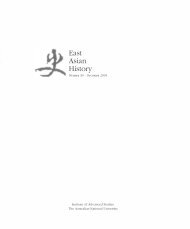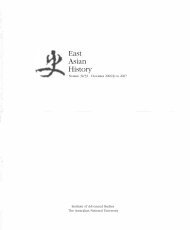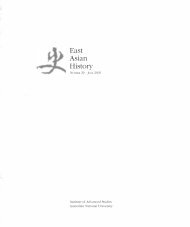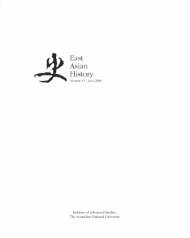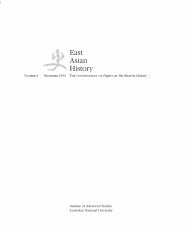(Philip Taylor) (PDF 3.1MB) - ANU
(Philip Taylor) (PDF 3.1MB) - ANU
(Philip Taylor) (PDF 3.1MB) - ANU
Create successful ePaper yourself
Turn your PDF publications into a flip-book with our unique Google optimized e-Paper software.
114<br />
PHILIP TAYLOR<br />
65 Ibid.<br />
66 Ibid., p.70.<br />
67 Pierre Brocheux, The Mekong delta:<br />
ecology, economy and revolution, 1860-<br />
1960 (Madison, Wis.: Center for Southeast<br />
Asian Studies, University of Wisconsin<br />
Madison, 1995).<br />
78 Nguyn Ccng Blnh et ai., Van h6a va cl1<br />
dan dling bang song citu long [The culture<br />
and population of the Mekong delta] (HE><br />
Chi Minh City: Social Sciences Publishing<br />
House, 1990), p.27.<br />
1. The baroque cultural character of this region ... can be described in<br />
summary: nothing about it is unique. Rather it should be understood as an<br />
incorporation (tbau b6a) of all kinds of things from all different regions<br />
gathered together here.<br />
2. As this is a busy crossroads always encountering the new, there is not one<br />
cultural pattern, artistic form, or cultural need or taste surviving in its original<br />
form over a specified time. Everything is in constant and rapid renewal (dtJi<br />
m6'i) creating new forms responding to the needs and tastes of each era.65<br />
3. [These two points have "organic links" with a third characteristic of Nam<br />
BQ culturel-that is, the faddishness and exoticism in the cultural taste of the<br />
people of Nam BQ.66<br />
Another work of note in this same vein was the study of the Western<br />
Mekong delta by French-Vietnamese historian, Pierre Brocheux.67 Brocheux<br />
argued that the Mekong delta's plural society, ostensibly a feature of French<br />
colonialism was in fact anticipated by and crucially instigated by the plural<br />
society of pre-colonial times, marked by a "vertical cellular structure" of<br />
different ethnic groups each performing complementary economic functions.<br />
Whereas such works elided the Significance of colonial modernization by<br />
finding it anticipated in pre-colonial times, others did so by omitting reference<br />
to the colonial power as he engineer of transformations during the colonial<br />
period. For example, the collectively written work, The Culture and Population<br />
of The Mekong Delta referred to the enormous project of canal digging in the<br />
late nineteenth and early twentieth century which had expanded the cultivable<br />
area of the Mekong delta fourfold.68 The authors argued that this had led to an<br />
unprecedented level of rice exports in the early twenties of this century: a level<br />
which had not been attained since. Western scholarship conventionally<br />
attributes these achievements to the French colonial project of expanding<br />
export agriculture and yet the above-cited work made no mention of these as<br />
French initiatives. Rather, by such omission, these externally-generated<br />
initiatives were Vietnamized, or, more precisely, indigenized as part of the<br />
distinctively dynamic history of the Mekong delta.<br />
Such views radically disputed the tradition-modernity dichotomization<br />
through which the French colonization of Vietnam had been taken to<br />
constitute an event of historic rupture with the past. For these authors French<br />
colonization in Vietnam represented less of a break with the past than<br />
previously conceived, particularly in the region of Na m Bf}, whose precolonial<br />
society was seen to have anticipated many of the features typifying<br />
modernity. As most of these authors focused on the period of Vietnamese<br />
settlement, up to two hundred years prior to the founding of the colony of<br />
Cochinchina, their works might be considered historical. However, classifying<br />
them as pre-modern historians or late imperial historians is problematic,<br />
given the kinds of claims they were making. They might be more suitably<br />
classed as modern historians, due to their collective efforts in shifting the<br />
inception of Vietnamese modernity back at least two hundred years prior to<br />
French colonization, as well as geographically delimiting its emergence to the


